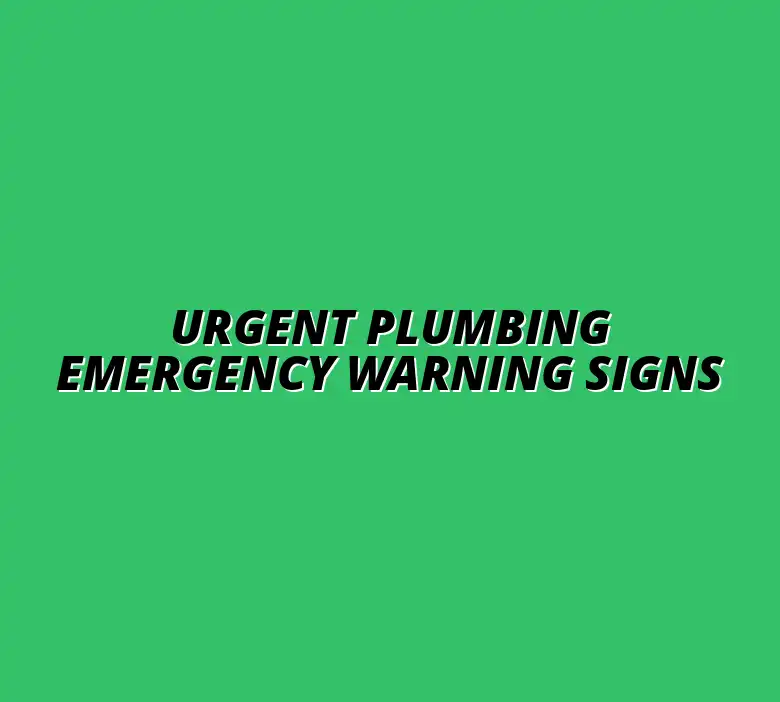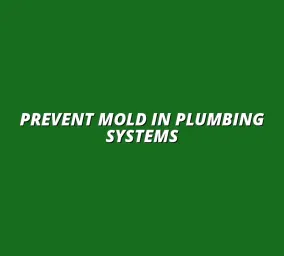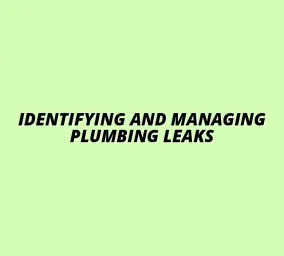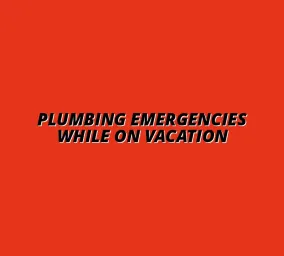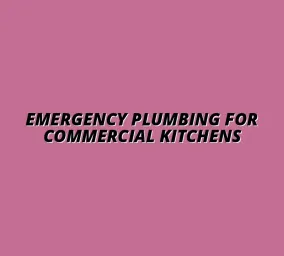Urgent Plumbing Emergency Warning Signs
Understanding Plumbing Emergencies and Their Importance
Plumbing emergencies can be more than just a nuisance; they can lead to significant damage if not addressed promptly. Understanding what constitutes a plumbing emergency is crucial for homeowners who want to protect their property. These emergencies often occur without warning, making it essential to recognize them and know how to respond.
When we talk about plumbing emergencies, we’re referring to any situation that poses an immediate risk to your home or its occupants. This includes issues like severe leaks, burst pipes, or blocked drains that can lead to flooding or extensive damage. Recognizing these emergencies can save you time, money, and a lot of stress!
Defining Plumbing Emergencies and Their Impact on Your Home
It’s vital to know what exactly makes a plumbing issue an emergency. Typically, if the problem could cause property damage or affect your family’s health and safety, it’s considered an emergency. For example, issues like overflowing toilets, sewage backups, or significant water leaks fall into this category.
The impact of plumbing emergencies on your home can be profound. Not only can they lead to expensive repairs, but they can also disrupt your day-to-day life. Here are a few potential impacts:
- Structural damage from prolonged water exposure
- Health risks due to mold and mildew growth
- Increased utility bills from leaks
What Constitutes a Plumbing Emergency?
A plumbing emergency is any urgent plumbing issue that needs immediate attention. Some common examples include:
- Burst pipes causing flooding
- Severe leaks that can’t be controlled
- Clogged drains that lead to backups
These situations require immediate action to prevent further damage and restore normalcy to your home. For example, a water heater leak is a serious plumbing emergency requiring immediate professional attention.
How Plumbing Emergencies Can Affect Your Property
The effects of plumbing emergencies can ripple throughout your property. Beyond just the immediate damage, such events can lead to prolonged issues like water stains, mold growth, and even compromised structural integrity. It’s essential to be vigilant and proactive when it comes to your plumbing.
Inadequate plumbing can also affect your home’s value. A history of unresolved plumbing issues might deter potential buyers, making it less appealing in the market. Therefore, staying informed about plumbing emergencies is not just about immediate repairs; it’s about protecting your investment!
Identifying Key Signs of a Plumbing Emergency
Knowing the warning signs of a plumbing emergency can help you act quickly before a small issue escalates. Being alert to these signs can save you from costly repairs and potential damage. Let’s look at some key indicators that you may have a plumbing problem on your hands!
Sudden Water Leaks and Their Consequences
One of the most obvious signs of a plumbing emergency is a sudden water leak. If you notice water pooling in unusual areas, it’s time to investigate. Ignoring leaks can lead to significant damage, including structural issues and mold growth.
Here are some common indicators of water damage:
- Water stains on walls or ceilings
- Peeling paint or wallpaper
- Warping floors or furniture
Recognizing Water Damage Indicators
Water damage can often be subtle at first. Look for changes that suggest moisture is present, like discoloration or unusual odors. Staying vigilant can help you catch problems before they become serious emergencies!
Pay attention to areas that are typically hidden from view, such as behind appliances or underneath sinks. Regular maintenance, as described in these essential bathroom plumbing maintenance tips, can help prevent many issues.
Immediate Actions to Take When You Spot a Leak
If you spot a leak, it’s crucial to act quickly. Here are steps you should follow:
- Turn off the water supply to minimize damage.
- Use towels or buckets to contain any water.
- Assess the situation and determine if you can fix it or need professional help.
Taking these steps can prevent further damage and help you manage the situation more effectively!
Unpleasant Odors Indicating Plumbing Issues
Another sign of a plumbing emergency can be foul odors emanating from drains or your home. These unpleasant smells are often a clear indication of plumbing problems like clogs or sewage issues. Addressing these odors swiftly can help prevent more extensive damage.
Understanding the source of these smells is essential. Common sources include:
- Clogged drains trapping food and waste
- Broken sewer lines leaking waste
- Dry P-traps allowing sewer gas to escape
Understanding the Source of Foul Smells
Foul odors can be more than just a nuisance; they may signal serious plumbing issues. If you notice a rotten egg smell, it may indicate a gas leak, which is extremely dangerous. Other smells, like musty odors, could point to mold growth, often due to hidden leaks.
Being aware of these scents can help you take action quickly. Don’t ignore unpleasant smells in your home; they are often a warning sign that something is wrong! Learning to recognize the signs your plumbing needs attention can prevent small problems from becoming big ones.
Steps to Address Unpleasant Plumbing Odors
To tackle unpleasant plumbing odors, follow these steps:
- Identify the source of the smell.
- Clean drains with a mixture of baking soda and vinegar.
- Consider calling a plumber if the smell persists.
Taking these actions can help restore freshness to your home and prevent potential plumbing emergencies!
Disruptions in Water Flow: Low Pressure and No Water
Have you ever turned on the tap, only to find a trickle of water instead of the normal flow? Sudden disruptions in water flow can indicate serious plumbing problems. Whether it’s low pressure or a complete loss of water, these issues are often signs of underlying issues that require immediate attention.
Common causes for low water pressure include:
- Clogged pipes due to mineral buildup
- Issues with the municipal water supply
- Leaking pipes that reduce overall pressure
Common Causes of Low Water Pressure
Low water pressure can be frustrating and can disrupt your daily routine. If you notice it, try checking other fixtures to determine if it’s a widespread problem. If it’s localized, the issue might be with a specific pipe or fixture.
In cases where the water supply has completely stopped, it’s best to contact a professional right away. This could signal a more significant plumbing emergency or a problem with the municipal supply. Knowing how to fix a water heater that won't start can help prevent some emergencies.
When to Call a Professional for Water Flow Issues
If you experience ongoing water flow issues, you should consider calling a plumbing professional. Here are some indicators that it’s time to seek help:
- Water pressure issues persist after checking pipes.
- You notice water pooling around fixtures.
- There’s no water coming from any taps.
These symptoms can indicate serious plumbing emergencies that require expert intervention. Don’t hesitate to reach out if you have concerns!
Drainage Problems: Slow Drains and Backups
Another common plumbing emergency is slow drains or backups. If your sinks or tubs are draining slowly, this might be a sign of a clog or blockage in your plumbing system. Ignoring these signs can lead to a more significant and disruptive plumbing issue.
Identifying slow drain symptoms can help you take action before a backup occurs. Look out for:
- Water pooling in sinks or tubs
- Gurgling noises when draining
- Foul odors coming from drains
Identifying Slow Drain Symptoms
Slow drainage can often be the first sign of a blockage. If you notice that water takes longer than usual to drain, it’s a good idea to investigate further. Sometimes, a simple fix like using a plunger can help, but other times, the issue may require professional help.
Keep an eye on multiple drains; if several are slow, it’s likely a sign of a more significant issue in your plumbing system.
What a Backup Could Mean for Your Plumbing System
A backup in your plumbing system can lead to a messy situation. This could indicate serious blockages or even problems with your sewage system. If you experience a backup, take immediate action to prevent further issues:
- Stop using water fixtures to prevent overflow.
- Call a professional plumber to assess the situation.
- Consider using a drain cleaning solution for minor clogs.
Getting to the bottom of drainage problems quickly can save you time and money!
Strange Noises Coming from Pipes
If you hear unusual sounds coming from your pipes, it could indicate a plumbing issue. Sounds like banging, gurgling, or hissing can often signal problems like air in the lines or pressure surges. Paying attention to these noises can help you catch plumbing emergencies before they escalate.
Different types of noises can mean different issues. Here are some common sounds and what they might signify:
- Banging: Water hammer, likely due to pressure changes
- Gurgling: Blocked drains or air in the plumbing
- Hissing: Leaks in pipes
Types of Noises and Their Implications
Each sound your plumbing makes can provide hints about the underlying issues. Banging pipes might mean you need to adjust the water pressure, while a gurgling noise could indicate a blockage. It’s wise to keep track of these sounds and address them promptly.
When in doubt, don’t hesitate to consult with a professional. They can diagnose the issue and recommend the best course of action for your plumbing system! For example, learning how to prevent frozen pipes this winter can save you a major headache (and plumbing bill).
How to Respond to Unusual Pipe Noises
If you hear strange noises, take some time to investigate. Here are steps to follow:
- Identify the source of the noise by checking the pipes.
- Look for visible signs of leaks or damage.
- Consult a plumber if the noises persist or worsen.
Quickly addressing unusual pipe noises can prevent larger plumbing emergencies down the road!
Visible Signs of Mold or Mildew
Mold and mildew often indicate a plumbing issue that needs urgent attention. If you see visible signs of mold growth, it could mean you have a hidden leak or moisture problem in your home. Tackling these issues quickly can help protect your home and health.
Here are some common signs that mold or mildew might be present:
- Dark spots on walls or ceilings
- Musty odors throughout your house
- Peeling paint or wallpaper
The Link Between Plumbing Issues and Mold Growth
There’s a clear connection between plumbing problems and mold growth. Moisture from leaks can create the perfect environment for mold to thrive. By addressing plumbing issues promptly, you can significantly reduce the risk of mold growth in your home.
Keep an eye on areas prone to moisture, like bathrooms and basements. Regular inspections can help you catch problems early and prevent mold from taking hold! Preventing pipe corrosion is a crucial part of preventative maintenance.
Importance of Immediate Action to Prevent Mold Spread
Taking immediate action when you see signs of mold is crucial. Here’s what you can do:
- Identify and fix the source of moisture.
- Remove any visible mold with appropriate cleaners.
- Consider consulting a professional if the mold is extensive.
Acting quickly not only protects your home but also your family’s health. Don’t wait for the problem to worsen—address it head-on!
Common Questions About Plumbing Emergencies
What Should I Do When I Suspect a Plumbing Emergency?
When you think you have a plumbing emergency, it's important to stay calm and act quickly! Start by turning off the main water supply to prevent further damage. This will help control the situation and minimize water loss in your home.
Next, check around your home for the source of the problem. Make a note of any visible leaks or issues that you can communicate to a plumber later. Gathering this information will be helpful when you contact a professional for assistance.
- Turn off the main water valve.
- Check for visible leaks or water damage.
- Document the issue with photos if possible.
Initial Steps to Take Before Professional Help Arrives
While you wait for a plumber, there are a few steps you can take to help manage the situation. If you have a wet/dry vacuum, use it to remove standing water. You might also want to place towels or buckets under leaks to contain the problem.
If the issue is related to a clogged drain, you can try using a plunger or a plumbing snake. Just be cautious and avoid using chemical drain cleaners as they can sometimes worsen the situation or damage your pipes.
- Use a wet/dry vacuum for standing water.
- Set up buckets or towels to catch leaks.
- Attempt to unclog drains with a plunger or snake.
Key Information to Gather for Your Plumber
When you call a plumber, having the right information can save time and speed up the repair process! Make sure to provide details about what you observed, including the location of the issue and any actions you have already taken.
Additionally, be ready to share details about your plumbing system, such as the age of your pipes and any previous plumbing issues you've had. This information can help the plumber diagnose the problem more effectively. If you need a plumber in Birmingham, consider checking out this resource.
- Describe the problem and its location.
- List any previous plumbing issues.
- Provide the age and type of your plumbing system.
When is It Necessary to Call a Plumber Immediately?
Knowing when to call a plumber can be tricky, but certain situations clearly demand immediate attention. If you notice a significant leak that can't wait, such as a burst pipe or flooding, don’t hesitate to reach out for professional help!
Another indicator for urgent plumbing services is if your water supply has stopped completely. Not only can this disrupt your daily life, but it may also signal a more serious issue that needs professional intervention.
- Severe leaks or flooding scenarios.
- Complete loss of water supply.
- Persistent sewer backups or clogs.
Criteria for Emergency Plumbing Services
Plumbing emergencies can often lead to extensive damage if not addressed quickly. Here are some clear criteria that generally indicate you should call for emergency plumbing services:
- Water leaks causing structural damage.
- Overflowing toilets that cannot be managed.
- Gas leaks or malfunctioning water heaters.
Understanding Emergency vs. Non-Emergency Repairs
It's crucial to differentiate between emergency and non-emergency plumbing issues. Emergency repairs require immediate action to prevent damage or restore essential services, while non-emergency repairs can usually wait for scheduled appointments.
For instance, a leaky faucet or a slow drain may be bothersome but doesn’t require urgent attention. Understanding these differences can help save you time and money in the long run!
- Emergency: Burst pipes, flooding, sewage backups.
- Non-Emergency: Dripping faucets, minor leaks.
- Emergency: Gas leaks, no hot water in winter.
Preparing for Potential Plumbing Emergencies
Regular Maintenance Tips to Prevent Emergencies
Being proactive with plumbing maintenance can go a long way in preventing emergencies! Regular inspections can catch minor issues before they escalate into major problems.
Consider scheduling yearly plumbing inspections with a licensed plumber. This can help identify wear and tear on your pipes, fixtures, and appliances, allowing you to address issues before they become emergencies.
- Schedule annual plumbing inspections.
- Check for leaks around pipes and fixtures.
- Flush water heaters regularly to prevent sediment build-up.
Importance of Routine Plumbing Inspections
Routine inspections can dramatically reduce the risk of sudden plumbing emergencies. They allow your plumber to spot potential issues, such as corrosion or root intrusion, that may not be visible to you.
Additionally, having a trusted plumber who understands your home's plumbing history can lead to more effective and timely repairs when necessary. A little preventive care can save you from big headaches later on!
DIY Maintenance Practices to Implement
There are quite a few simple DIY maintenance practices you can regularly perform. Start by checking your faucets and toilets for leaks, as even small drips can lead to larger issues over time.
Also, keep drains clear by using screens to catch debris and avoid pouring grease down the sink. These little habits can prolong the life of your plumbing and help you catch issues early!
- Inspect faucets and toilets for leaks.
- Use drain screens to catch debris.
- Avoid pouring grease or food down drains.
Creating an Emergency Plumbing Kit
Having an emergency plumbing kit can help you respond quickly when issues arise! This kit should contain essential tools and supplies to tackle minor plumbing problems before a plumber arrives.
Some crucial items to include are a plunger, a pipe wrench, Teflon tape, and a flashlight. These tools can empower you to handle simple repairs and help minimize damage!
- Plunger for clogs.
- Pipe wrench for tightening.
- Teflon tape for sealing leaks.
- Flashlight for dark spaces.
Essential Tools and Supplies for Quick Fixes
Along with basic tools, consider stocking up on supplies like plumber's putty, rubber gloves, and rags. These items can assist with quick fixes and keep you prepared for minor plumbing situations.
Having your emergency plumbing kit organized and easily accessible can make all the difference when a problem arises. You’ll be ready to tackle emergencies swiftly!
- Plumber's putty for sealing leaks.
- Rubber gloves for cleanliness and safety.
- Rags for cleaning up spills.
How to Use Your Emergency Kit Effectively
To use your emergency plumbing kit effectively, familiarize yourself with each tool and its purpose. Practice using the tools occasionally so that you feel confident when an actual emergency occurs.
Also, keep the kit in a designated area that is easy to access, such as a garage or utility closet. This way, you won’t waste time searching for it during a plumbing crisis!
- Know each tool's function.
- Practice using tools periodically.
- Store kit in an easily accessible location.
Final Thoughts on Plumbing Emergencies and Immediate Action
Summarizing the Critical Signs of Plumbing Emergencies
Recognizing the signs of plumbing emergencies can help you act swiftly and minimize damage! Key indicators include sudden leaks, unpleasant odors, and strange pipe noises.
When you notice these signs, remember to take immediate action. Whether it’s shutting off the water supply or calling a plumber, timely response is crucial!
- Sudden leaks or water damage.
- Unpleasant odors from fixtures.
- Strange noises from pipes.
Emphasizing the Importance of Timely Response
The sooner you address plumbing emergencies, the less likely they are to escalate into costly repairs. Always prioritize immediate actions when you suspect an issue, and don’t hesitate to call for help!
With proper understanding and preparation, you can protect your home from plumbing disasters. A proactive approach will keep your plumbing system running smoothly!
Encouraging Proactive Measures to Safeguard Your Home
Taking proactive measures can save you from future headaches! Regular maintenance, timely repairs, and having an emergency kit on hand can make a significant difference.
Additionally, building a relationship with a trusted plumbing service can ensure you receive reliable help when you need it most. It's all about preparing for the unexpected!
- Schedule routine plumbing inspections.
- Implement DIY maintenance practices.
- Keep an emergency plumbing kit ready.
Building a Relationship with a Trusted Plumbing Service
Finding a reliable plumber means you’ll have someone to call in times of need! Take your time to research local plumbers, read reviews, and ask for recommendations from friends and family.
Once you find a trustworthy plumber, don’t hesitate to reach out for routine maintenance or questions. A strong relationship with a plumbing professional will give you peace of mind, knowing help is just a call away!

